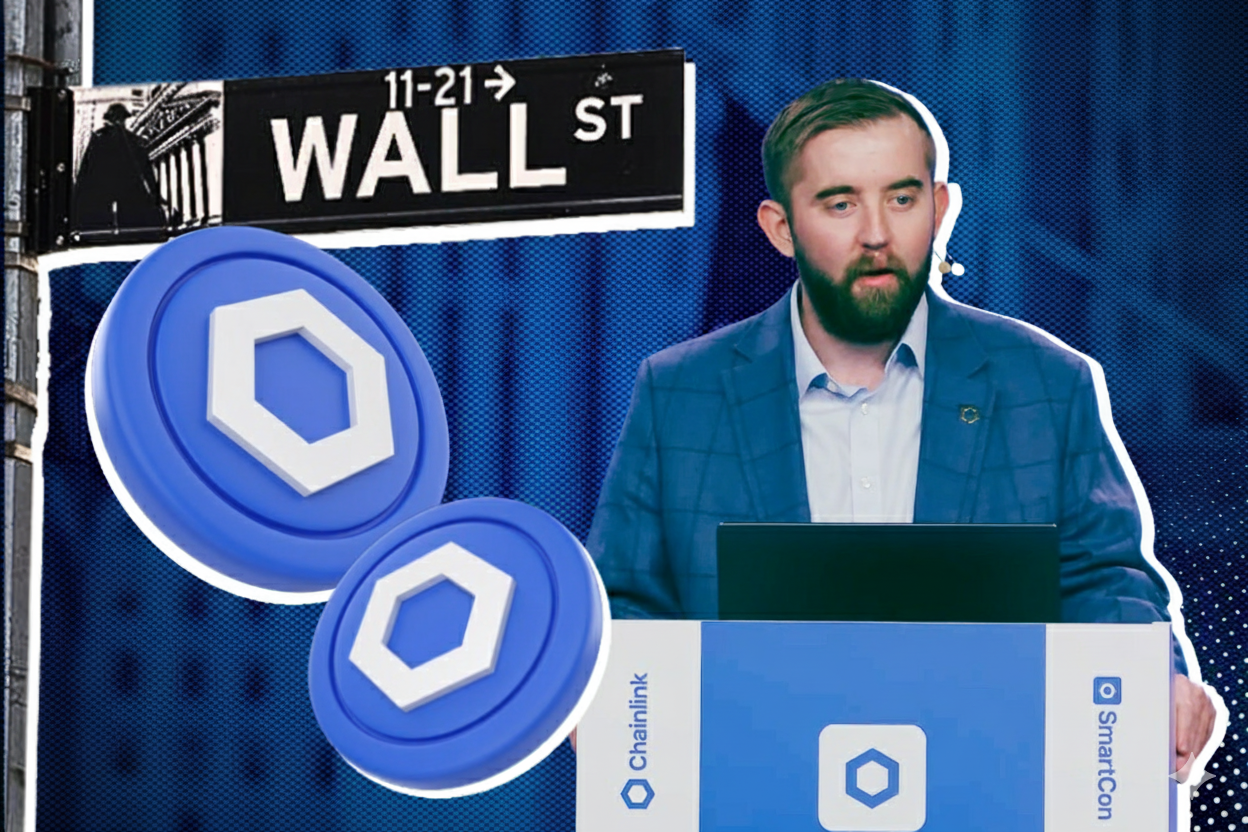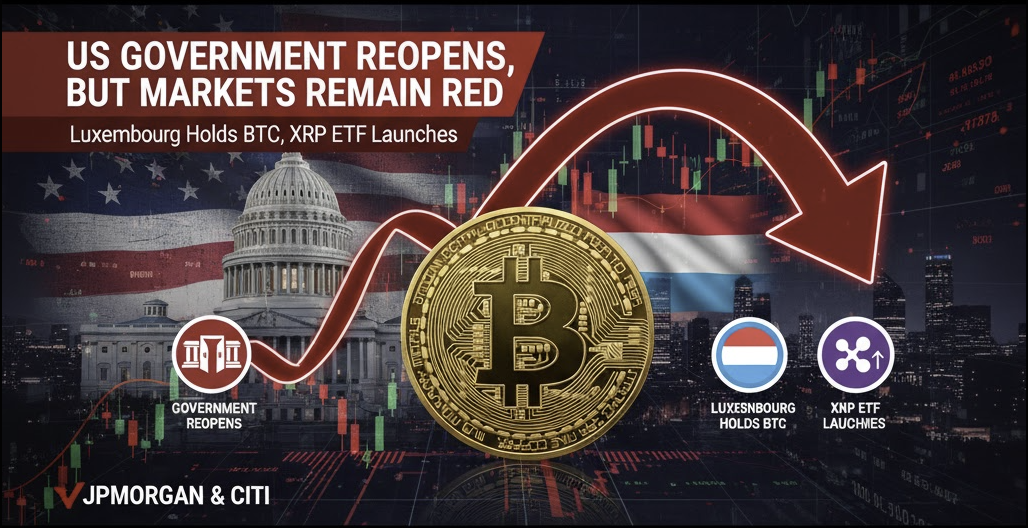Bitcoin has rallied, and the legal landscape surrounding stablecoins and crypto continues to be debated. Amidst these discussions, Bitcoin is gaining increasing acceptance and emerging as a trusted asset of choice.
Market Overview
US equities saw mixed performance on Wednesday, June 25th, following a strong recovery session on Tuesday. The Dow Jones dipped 0.25%, the S&P 500 remained flat, and the Nasdaq gained 0.31%. Stock futures leaned towards an upward trend. Both gold and oil saw slight increases, reaching around $3348 per ounce and $65 per barrel, respectively.
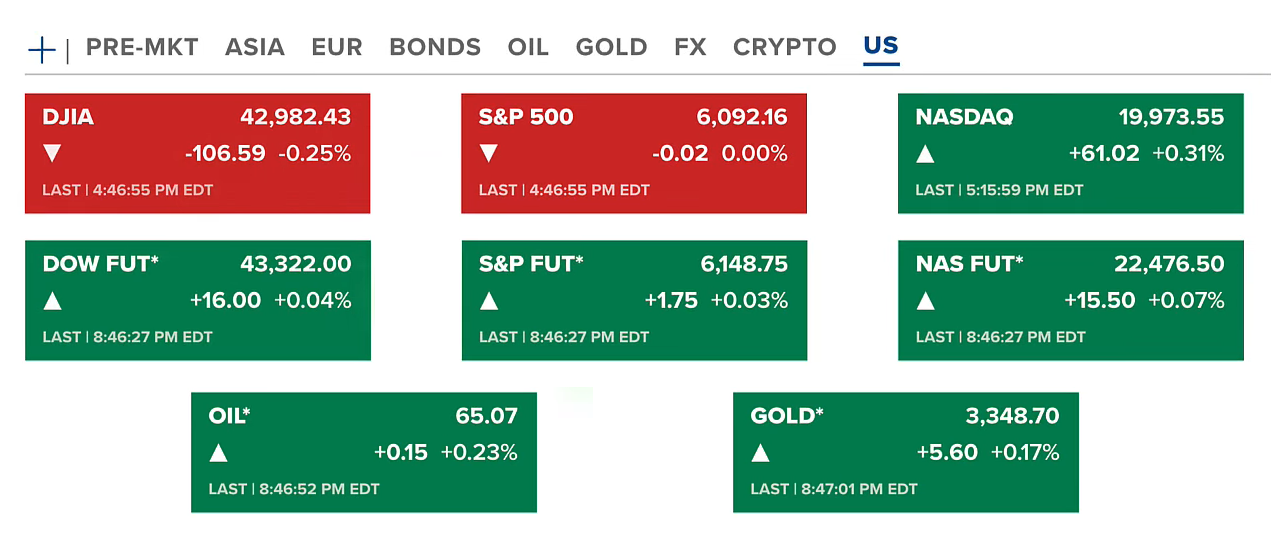
Bitcoin surged to approximately $107,000. While some major altcoins saw declines, the majority registered gains. The total cryptocurrency market capitalization stood at $3.43 trillion.
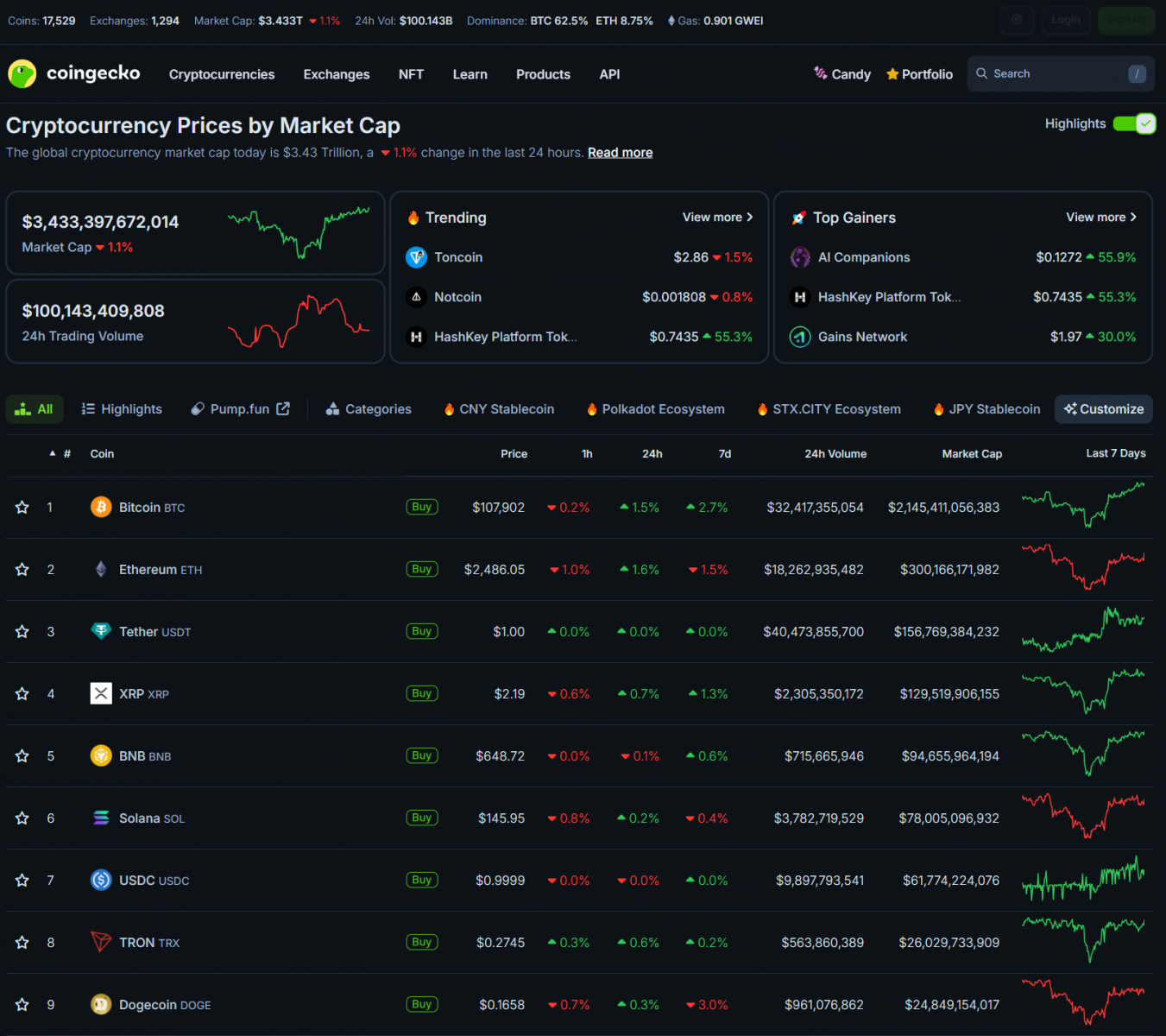
US Spot ETF Inflows Signal Strong Demand
US Bitcoin spot ETFs recorded significant inflows totaling $547.7 million on Wednesday, with the majority of the capital flowing into BlackRock's IBIT, Fidelity's FBTC, and Ark Invest's ARKB. ETH spot ETFs also saw positive inflows, accumulating $60.4 million. These consistent inflows into both Bitcoin and Ethereum ETFs underscore robust institutional demand and growing investor confidence in the regulated digital asset market.
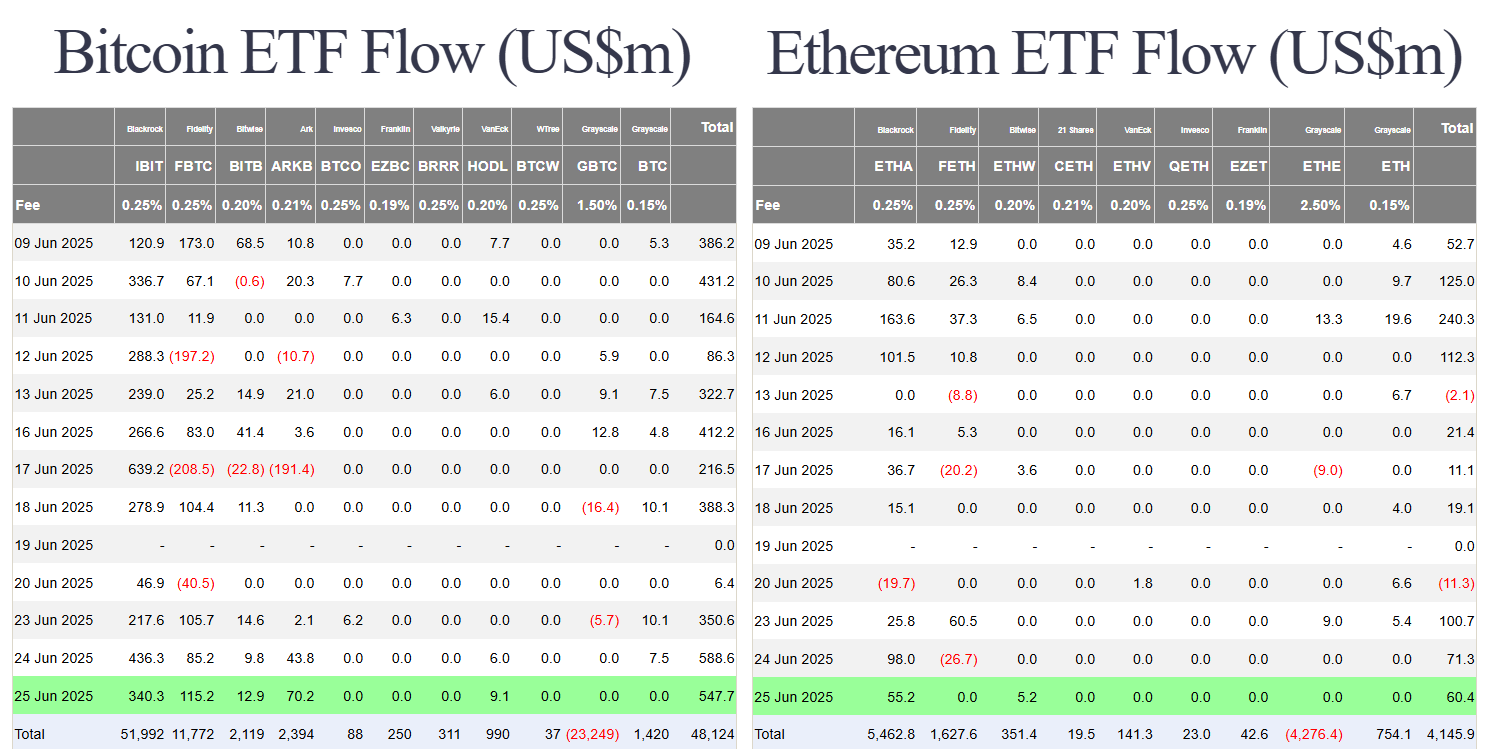
Fed Chair Testifies Before House Amidst Presidential Scrutiny
Federal Reserve Chairman Jerome Powell stated that the Fed will continue to hold interest rates steady until it can more clearly assess the impact of tariff policies on prices and inflation. He emphasized the Fed's cautious approach, awaiting additional data before adjusting monetary policy.
However, this stance may further displease President Trump, who continues to express strong opinions on the Fed's decisions. Chairman Powell maintained that political pressure does not influence the Fed's decisions, asserting that the central bank remains focused solely on its core functions.
Meanwhile, President Trump has sharply criticized the Fed Chairman, calling him "stupid" for keeping interest rates high and stating he's considering several candidates to replace the current Fed Chair. President Trump reiterated his harsh critique of Fed Chair Jerome Powell, branding him "terrible," "stupid," and having a "low IQ." President Trump argued that interest rates are being kept excessively high despite no inflation, which he claims will cost the US an additional $900 billion annually in borrowing costs. He suggested that interest rates should only be raised if inflation emerges in one to two years.
President Trump underscored that the US economy is experiencing tremendous growth, with tariff revenues pouring in and factories being built everywhere because no one wants to pay tariffs. Trump also mentioned that he has started reviewing several candidates to replace the current Fed Chairman. Concurrently, Vice President J.D. Vance also criticized Fed Chair Jerome Powell. Vance expressed his desire to hear an explanation as to why Powell cut interest rates by 0.50% just before the election, but now cannot do so when inflation is lower.
Legally, dismissing a Fed chair without just cause is highly difficult, making an early replacement unlikely. The President can only replace Powell when his term ends in May 2026 by nominating a new candidate for the Fed chair position. President Trump might be contemplating an early announcement of a successor to divert market attention from Powell's current statements. This is because financial markets operate on future expectations, so if the market believes interest rates will fall next year, optimism will return, even if current rates remain unchanged. Beyond Trump, Vice President J.D. Vance has also criticized Powell for not cutting interest rates when inflation is lower than it was during the pre-election cut.
US Stablecoin Bill & BIS Stance: Are Stablecoins "Money"?
The Bank for International Settlements (BIS) has declared that stablecoins, digital assets pegged to fiat currencies, do not qualify as "money" because they fail to meet three core criteria: singleness, elasticity, and integrity. BIS suggests it's too early to definitively confirm the role of stablecoins in the future monetary system.
.jpg)
This statement comes as the US Congress overwhelmingly passed a stablecoin bill, paving the way for wider adoption. However, approximately 30 senators still opposed the bill, expressing concerns about its potential impact on traditional financial institutions like Visa and Mastercard.
Stablecoins help reduce payment costs but put pressure on financial monopolies. Stablecoins have significantly lower transaction fees compared to traditional systems (like Visa, Mastercard), allowing payment providers to save costs and easily reduce product prices or offer customer incentives. Therefore, non-monopoly payment businesses support stablecoins, while large corporations tend to oppose them due to fears of market share loss.
However, a stablecoin is not fiat currency; it is merely a token pegged to fiat currency and backed by real assets. The US stablecoin bill also explicitly stipulates that issuing companies cannot refer to stablecoins as fiat currency or guarantee them with deposit insurance funds.
In South Korea, the country's largest bank, KB Kookmin Bank, is registering a trademark for a won-pegged stablecoin. While the government generally supports stablecoins, the Bank of Korea is concerned that domestic stablecoins could create a "bridge" to access USD-pegged stablecoins, potentially impacting national monetary policy.
Overall, despite BIS's reservations, stablecoins are being prepared for integration into future payment systems by many countries and major financial institutions. This indicates a strong belief in their utility and potential to transform global payments.
Meanwhile, US states continue to advance their own crypto-related legislation. Arizona recently passed bill HB2324, establishing a reserve fund for assets seized from criminal activities. If signed into law by Governor Katie Hobbs, this would be the state's second reserve bill enacted. Notably, Governor Katie Hobbs had previously vetoed two Bitcoin Reserve bills (SB1373 and SB1025), which would have allowed the state to invest in crypto. However, she did sign another bill, HB2749, aimed at creating a reserve fund for unclaimed property. These state-level initiatives highlight a growing legislative interest in digital assets, even as federal clarity is still sought.
Bitcoin Becomes a Reliable Asset: Shifting Perceptions
Philippe Laffont, founder of Coatue and an early investor in Facebook and Netflix, shared his regret about not having invested in Bitcoin yet. He once worried about Bitcoin's high volatility compared to NASDAQ, but now he sees Bitcoin as more stable and a more reliable asset.
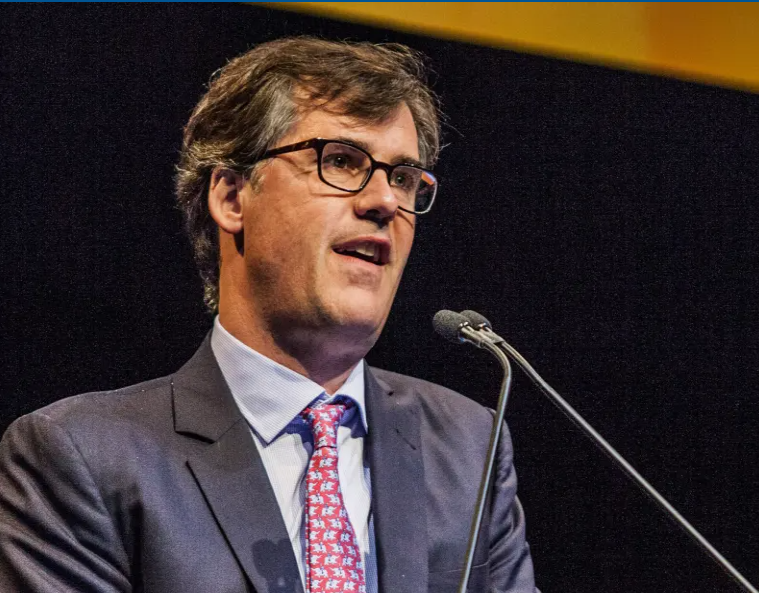
He believes Bitcoin's market capitalization could double or triple, reaching $4 trillion to $5 trillion and accounting for 1% to 2% of total global assets. Additionally, he suggests that trends such as de-dollarization and the weakening of the US's unique position will drive Bitcoin's growth. He candidly stated: "I've never invested in Bitcoin. And every day I wake up at 3 AM and ask myself: 'How could I be so stupid? What was I waiting for not to invest?' And it has continued to rise throughout this time."
Furthermore, insights from the world's largest investment fund also demonstrate their confidence in BTC's long-term future. Robert Mitchnick, Head of Digital Assets at BlackRock, the world's largest asset manager, stated that they view Bitcoin as an emerging global currency alternative. He described Bitcoin as a scarce, decentralized, non-sovereign asset, not tied to any country or its economic fate.
Mitchnick said: "At BlackRock, we view Bitcoin as an emerging global currency alternative—a scarce, decentralized, non-sovereign asset not tied to any country or its economy." He compared Bitcoin's appeal to gold, suggesting that from an investment perspective, Bitcoin is likely to behave similarly.
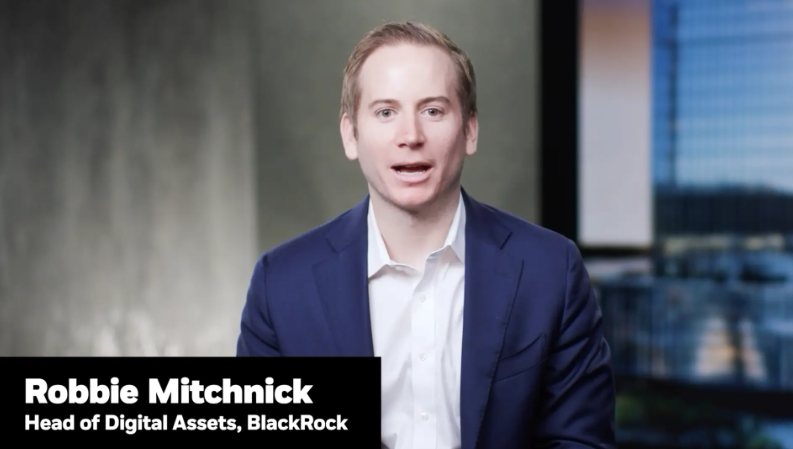
Both Philippe Laffont and BlackRock's statements show a positive shift in perspective towards Bitcoin, moving from skepticism to recognition of its long-term value. In the context of shifting geopolitical and global financial trends, Bitcoin is increasingly perceived not just as a speculative asset, but also as a store of value and an emerging global currency option. This further reinforces confidence in the growing role of Bitcoin and crypto in the future financial system.
Other Key Crypto Updates
ProCap BTC recently announced the purchase of an additional 1,208 BTC at an average price of $105,977. Currently, ProCap BTC holds a total of 4,932 BTC on its balance sheet. This newly formed company already holds more Bitcoin than even GameStop, highlighting aggressive institutional accumulation.
Norwegian deep-sea mining company Green Minerals plans to apply blockchain technology to its mining processes to enhance supply chain transparency and operational efficiency. This innovative application demonstrates the versatility of blockchain beyond finance.
Shares of sports betting company SharpLink Gaming surged 7% at the close of trading on Tuesday after the company continued to acquire an additional $30 million worth of ETH. The company now holds over 188,000 ETH and has staked all of it. SharpLink sold 2.54 million shares to raise $27.7 million, with most of the proceeds invested in additional ETH. This significant investment showcases a strategic corporate allocation into Ethereum.
Kaspersky has issued a warning about SparkKitty—a new malicious software specializing in stealing images from iOS and Android devices to search for crypto wallet recovery phrases (seed phrases). It infiltrates devices through applications on the App Store and Google Play and can collect other sensitive data beyond seed phrases. This highlights the ongoing cybersecurity risks in the crypto space.
Metaplanet raised 74.9 billion yen (approximately $515 million) on its first day to acquire more Bitcoin, part of a plan to own 30,000 BTC by the end of 2025 and 100,000 BTC by 2026 (nearly 0.5% of Bitcoin's total supply). The company currently holds 11,111 BTC and plans to invest $5 billion in its US subsidiary. Following this news, Metaplanet's stock price dropped 5%, indicating potential short-term market reactions to aggressive Bitcoin acquisition strategies.
Sources
- Bloomberg
- CoinDesk
- U.S. Treasury
- TradingView
- Reuters
- SEC
- White House Press Office
- Bank for International Settlements (BIS)
- Bank of Korea
- Kaspersky
Disclaimer
This article is for informational purposes only and should not be considered financial advice. Please do your own research before making investment decisions.


.png)



